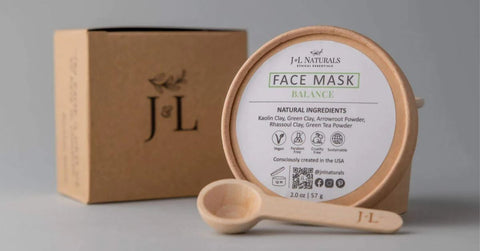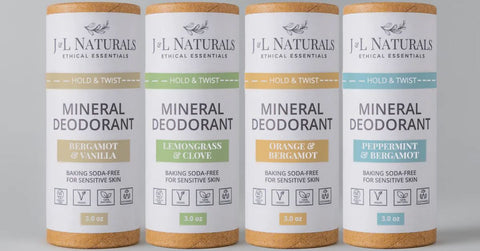FREE US SHIPPING WHEN YOU SPEND $35+
Vegan Deodorant 101: How to Find the Best Deodorant for Your Needs

Before the clean beauty movement in the 2010s, the only deodorant options we had were aluminum-filled, sweat-blocking anti-perspirants packaged in plastic made by non-cruelty-free brands; or, a cream deodorant in a glass jar that never worked made by your spiritual neighbor. *Insert infomercial voice here* What was an ethical consumer supposed to do? Stay six feet away from others pre-pandemic or choose the anti-perspirant?
After a decade of change, there are now hundreds of independent, cruelty-free brands that are not only making formulas that are ethically made—from the formula to the packaging—but that also work.
Whether you work in an office with low AC in the middle of summer, are regularly active, or simply want to avoid body odor, here’s a quick masterclass on everything you need to know to find the best vegan deodorant for your needs.
What’s the Difference Between a Deodorant and Antiperspirant?
One of the biggest issues ethical consumers face when using their first natural deodorant is that they are surprised when they find out they start to sweat more—and they assume this means that the deodorant does not work. Here’s where the issue lies. Even though we perceive deodorants to be an umbrella term that includes anti-perspirant, it’s not a given.
A deodorant helps to neutralize the smell and create an environment where bacteria cannot survive. The bacteria is what becomes the body odor, not the sweat itself.
An antiperspirant blocks the sweat coming out of your pores, which is caused by the inclusion of aluminum salt in a deodorant formula. Because aluminum is not considered a clean ingredient, ethical beauty brands avoid this ingredient for the health of their customers.

Is Aluminum in Deodorant Bad for You?
While sweating may feel unpleasant, uncomfortable, and even inconvenient, sweating is your body’s essential natural response to regulating your core temperature. Sweating allows your body to stay cool during the hotter months, thereby preventing heatstroke; it’s also a means of flushing out excess toxins, such as salt, calcium, and alcohol.
By using deodorants with aluminum compounds, you are temporarily blocking your body’s ability to sweat, which can lead to worse body odor down the line or other health issues.
Do You Need an Armpit Detox?
If you just switched to a natural deodorant and you notice your body odor is heightened, you might need an armpit detox. Once you stop using aluminum in your deodorant, your natural microbiome is no longer being altered and your body starts to overproduce bacteria. Your body has to learn how to regulate itself instead of relying on chemicals in your antiperspirant. Keep in mind, this is the first time—possibly in decades—that your pits are allowed to breathe and sweat naturally! Give your body some time to adjust to a new routine and new products. If you can wait three to six weeks to see if your new retinol serum works, you should give your pits the same grace period.
However, three to six weeks of extra body odor is not an ideal experience for anyone. If you’re looking to accelerate your armpit detox, here are a few quick tips.
- Hydrate: Drinking plenty of water will help flush out your toxins naturally.
- Avoid Rich and Acidic Foods: Animals proteins, fats, garlic, and onions are not your friends when it comes to pleasant body odor. Consider going vegan and asking for no onions on your burger.
- Break a Sweat: Purposefully go hard at the gym, sweat in a sauna, or enjoy a nice long walk. The more you sweat it out, the sooner the detox will be over.
- Bring a Towel or Wipes: If you do not have time to break a sweat, consider bringing an absorbent towel with you to aid you on the go. Bacteria thrives in warmer environments, so if you can keep yourself cool in the moment, you can help neutralize your body odor before it begins.
- Make a DIY armpit mask: Our Balance Face Mask is gentle enough to be used on your face and your sensitive pits! Combine with water or apple cider vinegar and paint away!

Should You Avoid Baking Soda in Deodorant?
Baking soda’s primary function is to absorb moisture, which is why many natural deodorant brands use baking soda as the clean replacement for aluminum. However, there is some stigma around this ingredient as it has been known to cause rashes in new users. Rashes can occur if you have yet to do an armpit detox, because your skin is already going through a drastic change; or it can be because you already have sensitive skin. Before writing off baking soda altogether, consider a DIY mask as mentioned above. Or, if you have sensitive skin, simply opt for a baking-soda free deodorant option and look for arrowroot powder in its place.
What Are Some Ingredients to Avoid in Deodorant?
There are quite a few ingredients under speculation for everything from skin irritation to hormone disruption. A few of the more widely-used ingredients would include: talc (absorbs moisture and oil), parabens (preservative), propylene glycol (absorbs moisture), triclosan (prevents bacterial buildup), and fragrances (scent). If you’re looking to avoid using animal products, you will also need to look out for beeswax and lanolin, two common ingredients found in skincare that can easily be replaced by vegan alternatives.
While many clean beauty brands focus on the ingredients they choose not to use, we choose to focus on the ingredients that we love to use. Some of our favorite skin-loving ingredients for deodorant include coconut oil, arrowroot powder, shea butter, clay, candelilla wax, and baking soda as they perform all of the same functions as the avoided ingredients above, and they are all vegan.

Benefits of a Vegan Deodorant
Not all vegan deodorants are made equally, but we would consider the ideal vegan deodorant to be vegan, clean, cruelty-free, and zero waste. The packaging would also be easily recyclable or compostable and be priced under $15. Currently, a few of the strongest brands on the market include Native, Ethique, and Meow Meow Tweet. But if you’re looking for an ingredient list with no fillers, no alcohol, and no added colors, our deodorant may be perfect for you.
J&L Naturals offers nine different scents, two different formulas (one with baking soda and one without), value packs to save you money, and a compostable container to help you feel good about keeping plastic out of your skincare routine.

Regardless of which brand and ingredient list you choose, we hope this guide helped you find the best vegan deodorant for your needs.

